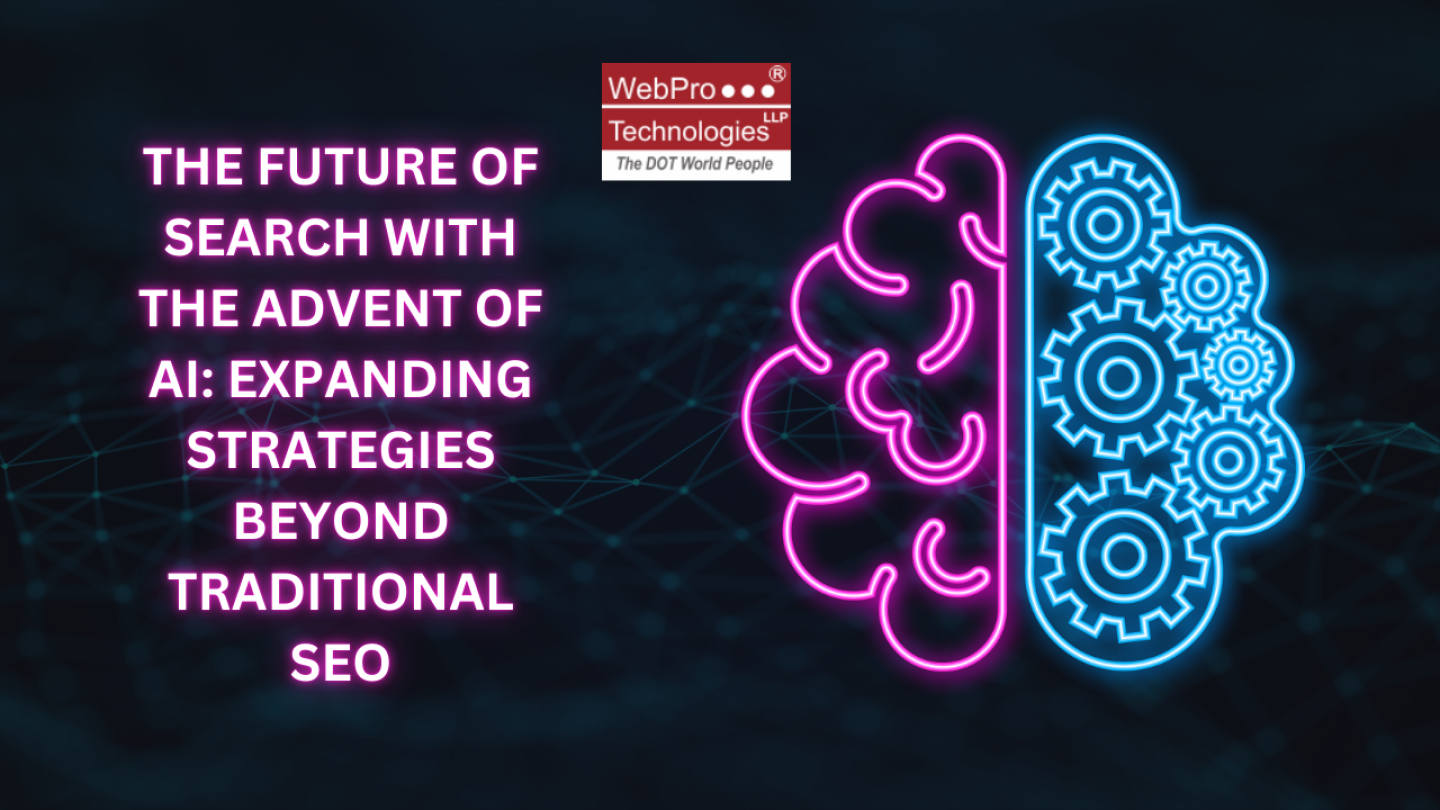The integration of artificial intelligence (AI) into search engines is fundamentally altering how we think about search engine optimization (SEO). As AI advances, it is reshaping not just the technology behind search, but also the strategies businesses use to ensure their visibility online. In this new era, traditional SEO tactics like keyword optimization and backlink building are no longer sufficient on their own. To stay competitive, businesses need to broaden their approach to include a variety of strategies that extend beyond their own blogs and websites.
Let us explore how companies can adapt to the future of search by embracing a comprehensive, multifaceted SEO strategy. The focus needs to be on seven key areas:
-
Expand Your Reach
In the past, a company’s SEO strategy often revolved around creating and optimizing content for its own website. While this remains important, the future of search demands a more expansive approach. Writing for multiple websites, including industry blogs, online magazines, and niche platforms, is becoming a crucial element of a successful SEO strategy.
By contributing guest posts, thought leadership articles, and opinion pieces to a variety of online platforms, businesses can significantly extend their reach. This approach not only helps in building high-quality backlinks, which remain a key factor in search engine rankings, but also exposes the brand to new audiences. It allows companies to position themselves as authorities in their field, fostering trust and credibility.
Moreover, writing for external websites offers a unique opportunity to engage with different communities and demographics. For instance, a tech company might write for tech blogs, but also contribute to business sites to reach entrepreneurs, or lifestyle platforms to connect with everyday consumers. Each piece of content should be tailored to the specific audience of the platform, ensuring relevance and resonance.
In the AI-driven future of search, where context and user intent are increasingly prioritized, this strategy becomes even more powerful. By appearing on various platforms, businesses can ensure that their content is seen by users with different intents, increasing the chances of appearing in relevant searches.
-
Amplify Content Reach
Influencer marketing has been a buzzword for several years, but in the context of AI-enhanced search, its importance is set to grow even further. Influencers, especially those who create high-quality content, can play a pivotal role in amplifying a brand’s message and extending its reach.
AI algorithms are becoming better at identifying content that resonates with users, which means that influencer collaborations can significantly boost a brand’s visibility. When influencers share content, whether it’s a blog post, video, or social media update, it’s more likely to be seen by a wider audience and, crucially, shared across networks. This increases the content’s relevance in the eyes of AI-driven search engines, which favor content that is popular and widely shared.
Collaborating with influencers also adds a layer of authenticity to a brand’s message. Consumers trust influencers who they follow and engage with regularly, and when these influencers endorse a product, service, or piece of content, it carries more weight than traditional advertising. In an era where AI is increasingly sophisticated at detecting and prioritizing genuine engagement, this authenticity becomes a powerful tool.
For businesses looking to leverage influencers, it’s important to choose partners who align with the brand’s values and target audience. Micro-influencers, those with smaller but highly engaged followings, can often be more effective than their mega-influencer counterparts, as they tend to have closer relationships with their followers.
-
Build Authority and Visibility
Another key strategy in the AI-powered future of search is ensuring your brand appears on relevant lists, directories, and podcasts. These platforms serve as valuable touchpoints where users actively seek out information, and being featured on them can significantly enhance a brand’s authority and visibility.
Directories, particularly those that are niche or industry-specific, are trusted resources that AI-powered search engines often prioritize. Being listed in these directories can improve a brand’s local SEO, especially for businesses that operate in specific geographic areas or industries. Moreover, directories often rank well in search engine results pages (SERPs), providing additional opportunities for visibility.
Lists, such as "Top 10" or "Best of" articles, are another powerful tool. AI-driven search engines prioritize content that provides clear answers to users’ queries, and lists are a highly effective format for delivering this information. Brands that secure a spot on these lists benefit from increased traffic, credibility, and often, backlinks from other websites.
Podcasts are also becoming an essential part of the SEO mix. With the rise of voice search, driven by AI, podcasts offer a unique opportunity to reach audiences in a more personal and engaging way. Being a guest on a podcast allows a brand to share its story, expertise, and insights directly with listeners, building a connection that is difficult to achieve through written content alone. Additionally, podcasts often have dedicated show notes pages that include links to the guest’s website, providing valuable backlinks that can enhance SEO.
-
Become the Primary Source for New Data
In the evolving landscape of AI-driven search, content that offers unique value stands out. One of the most effective ways to create such content is by conducting original research. When a brand publishes new data, insights, or findings, it positions itself as a thought leader and a primary source of information in its industry.
Search engines, especially those powered by AI, prioritize content that provides users with accurate, up-to-date, and original information. By conducting and publishing original research, companies can generate high-quality content that other websites and media outlets are likely to reference. This not only enhances the brand’s authority but also drives backlinks, which are crucial for improving search rankings.
Moreover, original research can serve as the foundation for a wide range of content types, from blog posts and whitepapers to infographics and webinars. Each of these content pieces can be optimized for different keywords and user intents, maximizing the research’s impact on SEO.
In an AI-driven search environment where content saturation is a growing challenge, original research provides a significant competitive advantage. It allows brands to create content that is not only relevant but also indispensable to their audience.
-
Engage and Retain Audiences
Social media and email marketing have long been staples of digital marketing, but their role in the future of search is becoming even more critical. AI’s ability to analyze vast amounts of data means that search engines are increasingly taking signals from social media and email engagement into account when determining rankings.
Social media platforms are now essential for distributing content and engaging with audiences. AI algorithms on these platforms prioritize content that generates high levels of engagement, such as likes, shares, and comments. For businesses, this means creating content that is not only informative but also shareable and engaging is more important than ever. Videos, polls, and interactive content tend to perform well on social media and can drive significant traffic to a website.
Email marketing, meanwhile, offers a direct line to consumers and can be a powerful tool for driving traffic, generating leads, and retaining customers. AI-powered email marketing tools allow for hyper-personalization, tailoring content to individual user preferences and behaviors. This not only improves open and click-through rates but also enhances the overall user experience, making recipients more likely to engage with the brand’s content.
Additionally, email newsletters can serve as a platform for distributing original research, promoting new blog posts, or highlighting guest appearances on podcasts. By regularly engaging with their email subscribers, businesses can ensure that their content remains top of mind, driving repeat visits to their website and improving SEO.
-
Boost SEO with Multimedia Content
Video content is rapidly becoming one of the most powerful tools in a digital marketer’s arsenal. AI-powered search engines are increasingly favoring video content, particularly as platforms like YouTube continue to grow in popularity. To maximize the SEO benefits of video content, businesses need to ensure that their videos are not only engaging but also optimized for search.
One key aspect of this is including a transcript with every video. Transcripts make video content accessible to a broader audience, including those who prefer reading or who may have hearing impairments. They also provide search engines with textual content that can be indexed and ranked. Including key phrases, an elevator pitch, and other essential information in the transcript can significantly enhance the video’s visibility in search results.
Moreover, video content can be repurposed in various ways to support other aspects of a brand’s SEO strategy. For example, a video can be embedded in blog posts, shared on social media, or included in email newsletters. Each of these uses increases the video’s reach and engagement, which AI-driven algorithms are likely to reward.
In addition to optimizing video content for search, businesses should also consider the role of video in building brand awareness and trust. Videos that showcase a brand’s expertise, tell a compelling story, or provide valuable insights are more likely to resonate with audiences, driving engagement and, ultimately, improving search rankings.
-
Differentiate Human-Made Content from AI-Generated Content
In a world where AI-generated content is becoming increasingly common, true thought leadership is one of the most effective ways to stand out. AI can create content that is technically accurate and well-structured, but it often lacks the unique perspective, creativity, and nuanced understanding that only humans can provide. By publishing content that offers a strong opinion, challenges the status quo, or presents a new way of thinking, businesses can differentiate themselves from the growing sea of AI-generated content.
Thought leadership involves more than just sharing expertise; it’s about leading conversations and influencing how people think about a particular topic. This type of content is particularly valuable in an AI-driven search environment, where search engines are increasingly prioritizing content that is not only relevant but also authoritative and engaging.
To create true thought leadership, businesses need to invest time and resources in understanding their industry, their audience, and the broader trends that are shaping their market. They should also be willing to take risks, presenting bold ideas and unique perspectives that challenge conventional wisdom. By doing so, they can create content that not only ranks well in search engines but also resonates deeply with their audience, driving engagement and building long-term brand loyalty.
Moreover, thought leadership content is highly shareable, increasing its chances of being cited by other websites, shared on social media, and discussed in industry forums. This not only enhances the content’s visibility but also its authority, both of which are key factors in SEO.
Point To Ponder On:
By adopting these strategies having a multifaceted approach, businesses can elevate their search rankings while forging deeper, more meaningful connections with their audiences. In a world increasingly shaped by AI, the most successful brands will be those that blend human creativity with cutting-edge technology, producing content that not only excels in search optimization but also deeply resonates with the people it’s intended to reach.
Such a comprehensive strategy will compel AI-driven search engines to prioritize your content. As search algorithms become more sophisticated, operating with an AI "brain," they are better equipped to understand context, user intent, and content quality. These algorithms can now discern between generic, automated content and material that is truly valuable and engaging. By creating thoughtful, original, and highly relevant content, you signal to these AI-powered systems that your brand is a leader in its field, worthy of being brought to the forefront of search results. This not only enhances visibility but also ensures that your content reaches the right audience, driving both engagement and conversion.






